Opportunities and Obstacles: Education for Sustainability
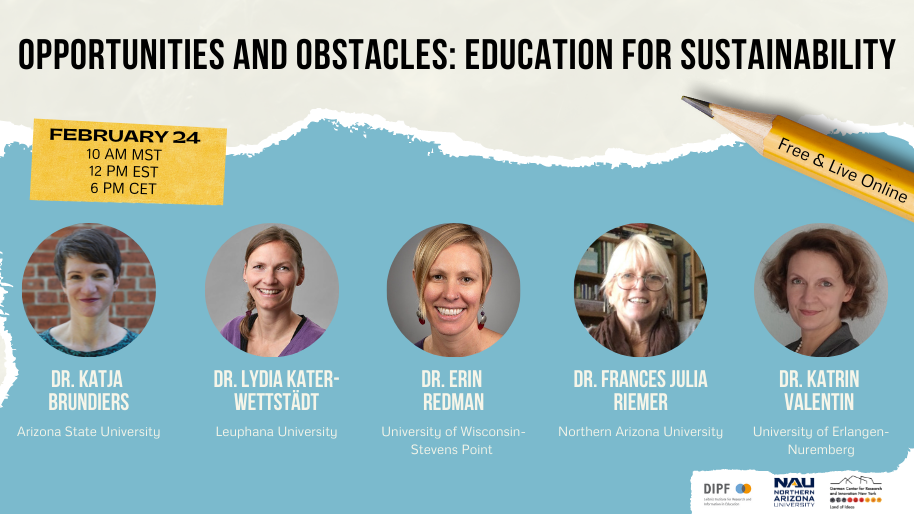
People around the world are increasingly recognizing the need to transform education in the face of climate change and other global challenges such as species extinction and environmental pollution.
Since the turn of the last century, the United Nations and UNESCO have been emphasizing the importance of Education for Sustainable Development (ESD), equipping learners with the knowledge and skills for a sustainable future, and interest in ESD has grown steadily in recent years. Nevertheless, attempts to fully integrate ESD in school curricula are still missing and environmental questions are often seen as a secondary issue rather than a necessary core component in school education.
Join our panel of experts on Thursday, February 24th at 12 PM (EST) for the second event in Contested Public Education, Pedagogical Conceptions and Sustainable Innovations to hear about:
- The responsibilities of education towards future generations
- Examples of ESD implementation
- Student-lead climate movements, such as Fridays for Future
The event is free and open to all, but registration is required.
Recording of the event
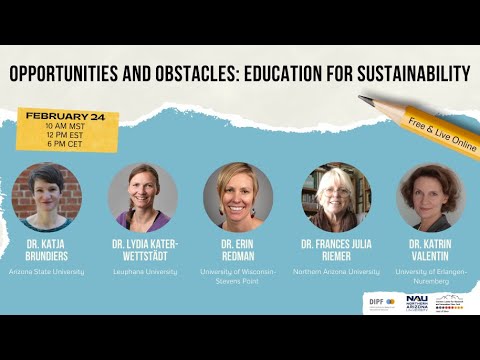
To play the video, click the thumbnail. Once activated data will be transmitted to the respective provider. Watch on YouTube
Event Information
February 24, 2022, 12:00 PM to 1:30 PM
Online
Organizer(s): Northern Arizona University, DIPF, DWIH New York
Panelists
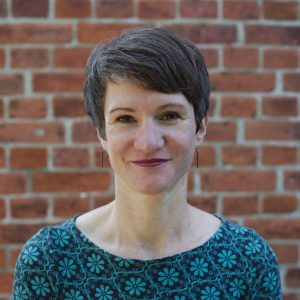
Dr. Katja Brundiers is a Clinical Assistant Professor at the School of Sustainability, College of Global Futures at Arizona State University, with a doctorate degree in sustainability science. Dr. Brundiers explores how to design professional education that integrates education for sustainable development and disaster management seeking to reduce disaster risk while advancing sustainability and resilience. She explores how key competencies in sustainability can be fostered through whole-person and project-based courses in collaboration with practitioners, and she researches how individuals bring about change for sustainability in disaster contexts. She has conducted research in Sri Lanka (2006), Indonesia (2014), New Zealand (2015) as well as in Puerto Rico and Arizona, USA.Dr. Katja Brundiers, Arizona State University
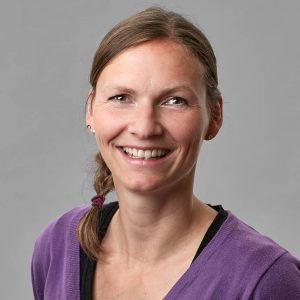
Dr. Lydia Kater-Wettstädt holds an administrative professorship for Education for Sustainable Development and Basic and Social Sciences at the Leuphana University. She has a background in linguistics, physical education and secondary school teaching, all of which informs her work. Her core interest in teaching and research is to support teachers develop a profound idea of future-oriented learning which empowers children to discover the world from different points of view and to help students actively develop their relationships to others and the world. She is currently an editorial board member of the International Journal of Educational Research and Development (IJERD) and serves as co-convenor in the network Environmental and Sustainability Education Research (ESER).Dr. Lydia Kater-Wettstädt, Leuphana University
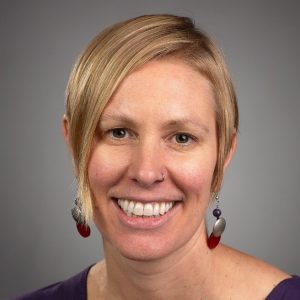
Dr. Erin Redman is the Director of the Educational Sustainability Doctoral Program and the Graduate Certificate in Education for Equity and Inclusion at University of Wisconsin-Stevens Point (UWSP). Prior to joining UWSP, Erin worked at Leuphana University Lüneburg (Germany), leading a collaboration amongst faculty and educators in Ireland, Mexico, Germany, and the United States to scale a sustainability professional development model for in-service teachers. She also worked as a professor at the National University of Mexico (UNAM), where she developed sustainability undergraduate courses and programs.Dr. Erin Redman, University of Wisconsin-Stevens Point (UWSP)
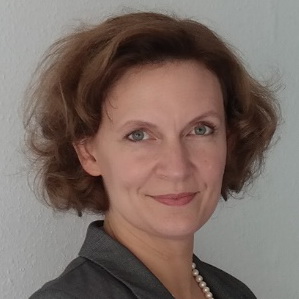
Dr. Katrin Valentin is Senior Research assistant and Study Manager for Education for Sustainable Development at the Centre for Teacher Education at the University of Erlangen-Nuremberg (FAU). Currently she is working at the ERASMUS+ project “ClimaTePD” at the Innovation in Learning Institute and in the teaching project “Education for Sustainable Development in Geosciences” at the Northern Bavaria Geo Centre. Her research interests span various fields of pedagogical action with a focus on education for sustainable development (currently: pull factors ESD), media education (video tutorials), school (talent development and aesthetic education), and child and youth work (subject-oriented basic research).Dr. Katrin Valentin, University of Erlangen-Nuremberg
Moderator
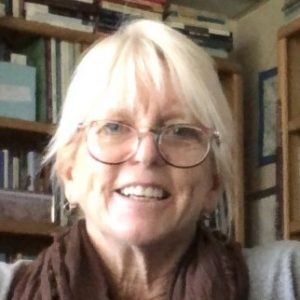
Dr. Frances Julia Riemer is Professor of Educational Foundations and Associate Faculty/former Director of Northern Arizona University’s (NAU) Women’s and Gender Studies Program. An educational anthropologist who has conducted ethnographic research in the US, Africa, and Latin America, she focuses on gender, development, and sustainable communities, change and issues of equity and access, and cultural difference and the social organization of community, school, and workplace. Dr. Riemer’s current research and writing projects investigate decolonial feminisms and tourism, safari and community-based natural-resource management in southern Africa, the intersectional gendering of niceness, first generation college students’ study abroad, and intersectional understandings of climate action. She organizes for progressive policies locally, and regularly speaks on Women’s Suffrage, the Equal Rights Amendment (ERA), and Gender and Climate Change.Dr. Frances Julia Riemer, Northern Arizona University
Organizers
Dr. Annika Wilmers, Senior Researcher, DIPF | Leibniz Institute for Research and Information in Education
Dr. Rose Ylimaki, the Del and Jewell Lewis Endowed Chair in Leadership in the College of Education, Northern Arizona University
